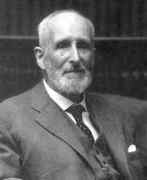Person: Perron, Oskar

Oskar Perron was a German mathematician best known for the Perron paradox:\n\n
Suppose the largest natural number is $N$. Then if $N>1$ we have $N^2>N$ contradicting the definition. Hence (!), $N=1$.
Mathematical Profile (Excerpt):
- Oskar began his schooling at the Volksschule in 1886 before moving to the Latin School in the autumn of 1889.
- In 1898 Perron was awarded his Abitur and later that year he began his studies of mathematics and physics at the University of Munich.
- After the award of his doctorate, Perron studied at Tübingen University and Göttingen University, where he worked with David Hilbert.
- It had been lectures at Munich by Alfred Pringsheim on continued fractions that had been a major influence on Perron and this 1905 paper on continued fractions continued Pringsheim's work on the topic.
- Perron also published Über eine Anwendung der Idealtheorie auf die Frage nach der Irreduzibilität algebraischer Gleichungen Ⓣ(On an application of ideal theory to the question of the irreducibility of algebraic equations) in 1905.
- Perron went on to complete his habilitation at Munich and was appointed a lecturer there in 1906.
- Perron's work on continued fractions led to him publishing the book Die Lehre von den Kettenbrüchen Ⓣ(The law of continued fractions) in 1913.
- In 1910 Perron accepted the offer of a post as extraordinary professor at Tübingen and then, on 13 December 1913, he became an ordinary professor at Heidelberg, taking up the appointment in 1914.
- His work in analysis is certainly remembered through the Perron integral.
- Perron published a number of important texts.
- Again this was a text which ran to several editions and Perron revised the text in 1960 when he was aged 80.
- One of the things he is best-known for is the Perron paradox which highlights the danger of assuming that a solution to a problem exists.
- Perron was invited to lecture at Göttingen University in the summer of 1933.
- The first "fighting" came in 1934 when Perron was president of the German Mathematical Society.
- Certainly at this time Perron seemed unable to understand that Bieberbach could really believe the things he was saying about race.
- Perron, together with Helmut Hasse and Konrad Knopp, decided to make a public declaration that Bieberbach's open letter had been published in the Society's journal against the wishes of the other editors.
- The September 1934 meeting of the German Mathematical Society at Bad Pyrmont was a difficult one for many of the members but particularly for Perron as President.
- Perron, as president, was in the chair and, following the constitution, asked non-members to leave.
- Perron wanted to keep the discussion to the fact that Bieberbach had published the letter in the Society's Journal without discussing it with the other editors.
- It was a very difficult meeting for Perron and, as a consequence, there was a move by the Reich Ministry to remove Perron from his post, but it seems to have been dropped.
- Holidays in Switzerland gave Perron the opportunity to see what the rest of the world was reporting about the Nazis.
- However that may be, we wish him well, for Perron has done yeoman service in writing textbooks for universities and technische Hochschulen.
- We also note that Perron had been honoured with election to the Heidelberg Academy of Sciences in 1917, the German Academy of Scientists Leopoldina in 1919, the Bavarian Academy of Sciences in 1924, and the Göttingen Academy of Sciences in 1928.
- He argued in favour of "German physics" and had many disagreements with Perron.
- Although Perron formally retired in 1951, he continued to teach certain courses at Munich until 1960.
- Perhaps most remarkable of all Perron's books was his text on non-euclidean geometry which he published at the age of 82.
- Despite the large amount of mathematics which Perron produced over a long career, he also had other interests.
- As well as the honours Perron received through election to the academies mentioned above, he was also awarded an Honorary doctorate from the University of Tübingen in 1956, an Honorary doctorate from the University of Mainz in 1960 and the Bavarian Order of Merit in 1959.
Born 7 May 1880, Frankenthal, Pfalz, Germany. Died 22 February 1975, Munich, Germany.
View full biography at MacTutor
Tags relevant for this person:
Origin Germany
Thank you to the contributors under CC BY-SA 4.0! 

- Github:
-

- non-Github:
- @J-J-O'Connor
- @E-F-Robertson
References
Adapted from other CC BY-SA 4.0 Sources:
- O’Connor, John J; Robertson, Edmund F: MacTutor History of Mathematics Archive
